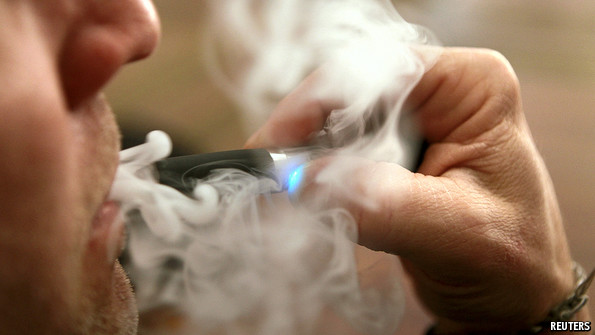BETTING against an industry with addicts for customers carries obvious risks. But these are uncertain times for Big Tobacco. Electronic cigarettes, once dismissed as a novelty, now pose a serious threat. E-cigarettes work by turning nicotine-infused liquid into vapour, which is then inhaled. A user is therefore said to be “vaping”, not smoking. More important, he or she is not inhaling all the noxious substances found in ordinary smokes.

The latest wheeze
In 2012 sales of e-cigarettes in America were between $300m and $500m, say analysts. That is paltry compared with the $80 billion-plus market for conventional cigarettes in the country. But e-cigarette sales doubled last year, and are expected to double again in 2013. Bonnie Herzog of Wells Fargo, a bank, believes sales of e-cigarettes could overtake sales of the normal sort within a decade.
That may depend on how governments react. E-cigarettes are probably not good for you. One study showed that vaping decreased lung capacity. Yet a switch from smoking to vaping could improve public health, some say. E-cigarettes may help smokers quit more efficiently than nicotine patches or gum. This notion has not been thoroughly tested, however, so governments are wary.
America has warned e-cigarette manufacturers not to make health claims. New tobacco guidelines in Europe would either tightly limit the nicotine content of e-cigarettes or force them to undergo clinical trials, as pharmaceutical products do. Elsewhere a patchwork of regulation exists, including outright bans in some countries.
None of this has stopped companies from pitching to consumers. In America and Britain advertisements for e-cigarettes have appeared on television—forbidden territory for standard cigarettes. Craig Weiss, the head of NJOY, America’s top-selling brand of e-cigarettes, vows to make traditional ones obsolete. His ads crow: “Cigarettes, you’ve met your match.”
America’s tobacco giants do not think he is blowing smoke. Last year Lorillard (the maker of brands such as Newport and Kent) bought Blu, an e-cigarette maker, for $135m. NJOY is rumoured to be facing a takeover, perhaps by Altria (the maker of Marlboro). Foreign cigarette makers, such as British American Tobacco and Japan Tobacco International, also have stakes in the industry, while other firms are working on their own vaporous offerings.
E-cigarette executives dream of relegating traditional cigarettes to the ashtray of history. But as they struggle with taxes, patents and red tape, they may come to envy Big Tobacco’s deep pockets. More deals are likely, thrashed out no doubt in vapour-filled rooms.
Source: The Economist

Leave A Comment
You must be logged in to post a comment.